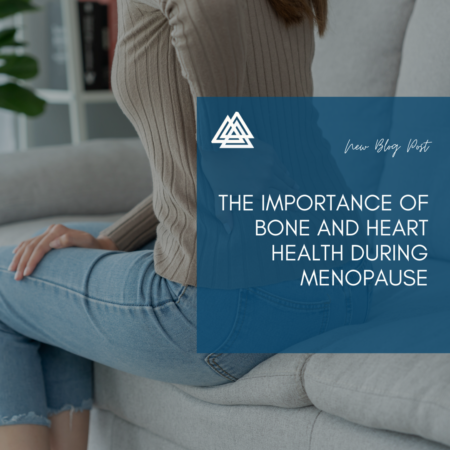 Menopause is a significant phase in a woman’s life, bringing many changes both physically and emotionally. Among the most important health considerations during this time are bone density and heart health. As hormone levels shift, particularly the decline of estrogen, women become more vulnerable to certain health risks, including osteoporosis and cardiovascular disease. Understanding these risks and how to manage them is essential for maintaining long-term well-being.
Menopause is a significant phase in a woman’s life, bringing many changes both physically and emotionally. Among the most important health considerations during this time are bone density and heart health. As hormone levels shift, particularly the decline of estrogen, women become more vulnerable to certain health risks, including osteoporosis and cardiovascular disease. Understanding these risks and how to manage them is essential for maintaining long-term well-being.
The Connection Between Menopause and Bone Health
One of the key impacts of menopause is on bone density. Estrogen plays a crucial role in maintaining bone strength by helping to regulate the bone remodeling process, which involves the breakdown of old bone and the formation of new bone. When estrogen levels drop during menopause, this balance is disrupted, leading to a greater breakdown of bone than the body can replace. This process can result in a condition called osteoporosis, where bones become weak and brittle, increasing the risk of fractures.
According to the National Osteoporosis Foundation, women can lose up to 20% of their bone density in the first five to seven years after menopause. This significant reduction in bone mass means that postmenopausal women are at a higher risk for fractures, particularly in the hips, spine, and wrists.
Tips for Maintaining Bone Health:
- Calcium and Vitamin D Intake: These nutrients are essential for bone health. Women over 50 should aim for 1,200 mg of calcium and 600–800 IU of vitamin D daily. Calcium-rich foods include dairy products, leafy greens, and fortified cereals. Vitamin D can be absorbed from sunlight, but supplements may also be necessary.
- Weight-Bearing Exercise: Activities like walking, jogging, and resistance training can help strengthen bones. Regular exercise also improves balance and coordination, reducing the risk of falls.
- Bone Density Tests: Talk to your healthcare provider about getting a bone density test to assess your risk for osteoporosis. Early detection can lead to better management and preventive measures.
Menopause and Heart Health: Understanding the Risks
While menopause is often associated with bone health, its impact on cardiovascular health is equally significant. Estrogen also has a protective effect on the heart and blood vessels, helping to maintain healthy cholesterol levels and blood pressure. As estrogen levels decline, women face an increased risk of developing heart disease, which is the leading cause of death for women in the United States.
After menopause, LDL (bad) cholesterol levels often rise, while HDL (good) cholesterol levels may drop. Additionally, blood pressure tends to increase, contributing to a higher risk of atherosclerosis (hardening of the arteries), heart attacks, and strokes.
Tips for Maintaining Heart Health:
- Heart-Healthy Diet: Focus on a diet rich in fruits, vegetables, whole grains, lean proteins, and healthy fats like those found in olive oil and fatty fish. Limit saturated fats, salt, and processed foods to help manage cholesterol and blood pressure levels.
- Regular Physical Activity: Aerobic exercise, such as walking, swimming, or cycling, helps strengthen the heart and improve circulation. Aim for at least 150 minutes of moderate-intensity exercise per week.
- Monitor Blood Pressure and Cholesterol: Regular check-ups with your healthcare provider are crucial. Keeping track of your blood pressure, cholesterol levels, and blood sugar can help you manage your heart health more effectively.
- Avoid Smoking and Limit Alcohol: Smoking significantly increases the risk of heart disease, especially after menopause. If you smoke, seek help to quit. Limiting alcohol consumption can also help reduce heart disease risk.
The Power of Prevention and Early Intervention
Both osteoporosis and heart disease develop over time, often without obvious symptoms. That’s why early intervention is so important. Regular screenings, adopting a healthy lifestyle, and staying informed about the risks associated with menopause can empower women to take control of their health.
Managing Overall Well-Being
Menopause is a natural stage of life, but it requires active attention to protect your bone and heart health. By focusing on nutrition, exercise, and regular medical check-ups, you can minimize the risks and maintain a strong, healthy body for years to come.
Stay proactive and prioritize your health during menopause—it’s an investment that pays off throughout your life.
